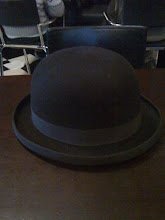I've read this little article on the Globe and Mail recently, which is an interview with Claire Harman. She likes to write biographies on Jane Austen. Asks the interviewer, "Jane herself has been turned into a fictional character. How do you feel about taking real figures and imputing behaviour, emotions and language to them?"
Responds Harman, "As a biographer, I find it a bit dodgy. Why not just make the characters totally fictional? It's hard enough writing biography and getting the facts right. If you've got something to say about a character, you could manage it in another way than suggesting the possibility that it happened."
Ha ha ha. Yeah.
Don't get me wrong. I see where she's getting at. Yes, maybe historical figures such as Jane Austen would be pissed that people are projecting their murder mystery solving or vampire fantasies onto her. But seriously? This shit's as old as literature and it ain't ever going away. Why? Because it's pretty fucking entertaining.
Take, for example, that hack Alexandre Dumas. Take his treatment of Cardinal Richelieu in The Three Musketeers, to say nothing of the holy man's treatment in the various adaptations of the novel. In real life, he was not a nice man, true. But he was a not-nice man in service of the king and pretty firmly so. He liked power, but he used it to benefit Louis XIII and France. But let's face it: he makes a fine villain.
And what of Shakespeare? He surely wouldn't stoop so low as to debase the memory of deceased individuals solely to further his own writing - oh wait! He did! With a whole whackload of history plays! I'm sure Richard III would be pleased as punch over being portrayed as a murderous hunchback. Oh wait, we don't care. Because Richard III is an awesome play.
And we all know of the myriad treatments of the tale of Robin Hood and their nuanced treatment of King Richard I, who left England for years and years to go off warring in the Holy Land because he didn't give a shit about that country and liked killing things, and Prince John, whose initial problems were largely caused by Richard's screwing off and leaving behind a whole hell of a lot of debt. Because even crusades cost money, go figure.
The point I'm getting at here is that as far as fiction goes, historical purity doesn't matter. The worst case scenario is that the consumer of said fiction goes away with an inaccurate picture of a historical personage without a burning desire to learn the real story. This is not, to my mind, appreciably worse than them not knowing about that personage in the first place. The best case scenario? They think, "Oh! That character was cool! And s/he was based on a real live person! I will read about it." In which case, they might seek out a nicely written biography and educate themselves. People like Harman might even get an uptick in sales. Everyone wins.
(Has this happened to me? Yes. That is why I get every book on Sir Francis Walsingham, badass Elizabethean spymaster, that I can lay my grubby mitts on.)
So bring on the historicals, the mysteries, the horrors, the comedies the Roosevelt-in-Space serials. It's all in good fun and far be it for us to be bitching about other people's reading habits when it's lovely that they're reading, period. Better that than supposed non-fiction that has only a glancing relationship with reality. Alison Weir, I'm looking at you, you hack.
I'll go breathe now.
Subscribe to:
Post Comments (Atom)

I'm not familiar with the author who set your rant off, but isn't she just suggesting that history and fiction should be separated? It's hard to tell what she is saying (I don't fully understand her argument, though I get yours), but since historical fiction is so bloody entertaining, and hisoty is highly speculative, it's a lot easier to migrate towards the fictional side of things.
ReplyDelete